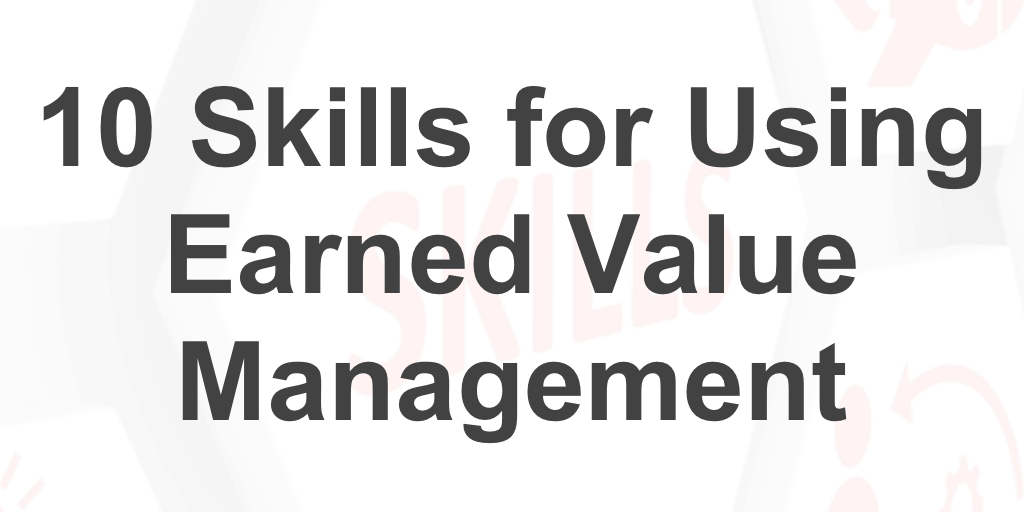 Earned Value Management Skills
Earned Value Management Skills
Earned value management is a core expectation for many US government contractors. There are many technical aspects to understand, from software to formulas, reporting and data analysis. However, to get the most out of earned value, it’s also worth investing in what PMI calls ‘power skills’.
Power skills are the ‘soft’ aspects of project management that comprise the interpersonal skills required to get the job done. We’ve picked out the top 10 skills for professionals using earned value management – beyond the technical basics. Let’s dive in.
1. Communication
First up, communication. EV is a communication tool. It’s designed to surface information – but you need to be able to share that effectively with the client and internal stakeholders. Whether it’s a quick phone call or a formal presentation to executives, you should be able to share earned value metrics in a way that helps other people understand what they are all about.
Communication skills include presenting, writing, speaking and listening. These are all important for getting your message across and making sure people understand project progress.
2. Leadership
Leadership is a cross-discipline skill that is useful in so many settings, even if you aren’t the prime contractor, lead project manager or client. You can set an example to others in learning from and acting on the EV metrics. It’s also important to lead with your behavior in challenging poor project performance and accurately capturing inputs to the earned value tools.
3. Attention to detail
EV reports draw from many data points, and it’s essential that the data into the system is accurate. Poor inputs lead to inaccurate reports and potentially the wrong decisions being made.
Pay attention to the details and don’t make assumptions. For example, check everyone understands the basis of estimate, how to deal with level of effort activities, what deadlines are important for timesheets and so on.
4. Curiosity
So the data doesn’t look right to you? Don’t ignore it – bring your curiosity into play and dig into the detail. Sometimes mistakes happen, and if something looks off, you can bring that to the right people’s attention or investigate yourself.
Take the time to understand where the numbers are coming from, so you can better interpret variance analysis reporting and the other data sets.
Stay curious and be interested in what is happening and what the numbers are telling you.
5. Data analysis
Data analysis skills include being able to represent data graphically. If you usually rely on tables, try creating a graph. If you’ve never really understood the S-curve of earned value, put some effort into getting to grips with it.
Data analysis skills can be learned. In our experience, some people enjoy investigating numbers more than others, so if that’s the case for you, consider how you can spread the work around the team members who have numbers as their special skill.
6. Business acumen
You do need a bit of a head for figures for earned value management. While you don’t have to be a math genius, it helps to have some exposure to the business context so you can see how the data flagged up by the earned value metrics relate to the real-life operations of your business.
This will help you and the team identify the impact of schedule overruns or cost performance issues. It can also help with risk identification and choosing the right mitigation actions.
7. Influencing
Understanding the reports is one thing: getting people to take action as a result of what they are telling you is something completely different.
Influential leaders can convince others to act differently or to take a different course of action as a result of their behavior. It’s important in project management settings as you rarely have hierarchical power over all the stakeholders, so getting things done by influencing others is a key way to keep the project moving forward.
8. Problem solving
Put your problem solving skills to good use as you try to uncover where the inaccuracies might be coming from.
Techniques to help solve problems include the 5 Whys, Ishikawa diagrams, root cause analysis and more. Build out a range of tools that you can use to help the team solve problems, and be prepared to step up and facilitate the way to an answer.
9. Technical literacy
This just means being able to use computers confidently. Given that these days so much of project management involves using different scheduling and earned value tools, it is important to know your way around a keyboard.
Software training will help you build confidence and give you insights into the tips and tricks that make it easy to get the tools to do what you want.
1o. Teamwork
Earned value management is a team effort. From planners and schedulers, PMO officers, project managers, individual contributors and data analysts, the whole ecosystem of project management relies on the team working together.
Whatever role you have in the project, you can foster a sense of team spirit and collaboration by working together.
This list of 1o skills for getting the best out of earned value management is only the starting point. We cover a lot more in our earned value management training, including all the technical skills and certification prep required to bring the whole team up to speed and compliant with your contract requirements.
